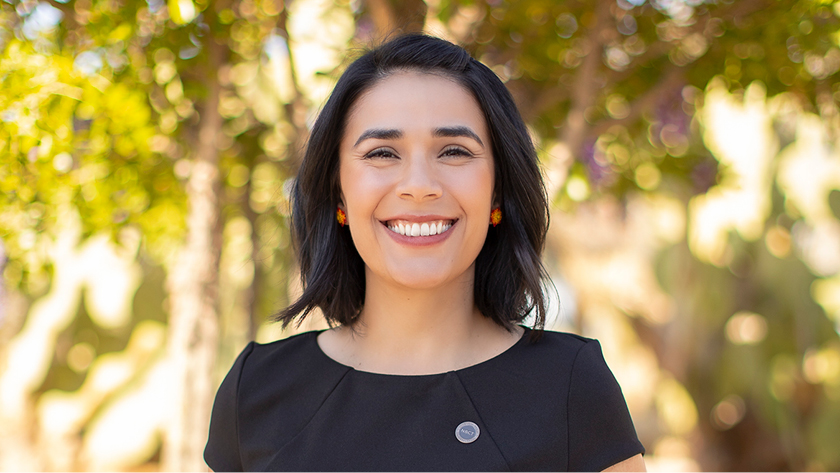
PHOTO CREDIT: MELISSA ESPARZA
Juliana Urtubey, a bilingual elementary special education teacher in Nevada’s Clark County School District, is the 2021 National Teacher of the Year. A National Board Certified instructor, she co-teaches students from preK through fifth grade at Booker Elementary School in Las Vegas and develops strategies to meet students’ differing academic, social-emotional, and behavioral needs. Students dubbed Urtubey “Ms. Earth” for her work with a school gardening program.
Born in Colombia, she knows firsthand the challenges of being an English learner student and the success that’s possible when schools embrace the diversity of students and families.
Urtubey spoke with ASBJ’s Michelle Healy about supporting English learners, the need for full funding of the Individuals with Disabilities Education Act (IDEA), advocating for “a joyous and just” education for every student, and more. She will discuss many of these topics during her presentation at NSBA’s Annual Conference April 2-4 in San Diego.
(This interview was edited for length and clarity.)
How does the underfunding of IDEA impact teachers?
It’s so important for folks to realize that whether or not you have a child with special needs or are a teacher who works with children with special needs, fully funding IDEA benefits the entire school system. When we center inclusion, making sure that our students with special needs, learning and thinking differences, have what they need, the whole school benefits. It’s projected that if the full 40 percent of federal funding were met, special education teachers would have more manageable caseloads, which would allow us to give more individualized support for our students, and we could really streamline early intervention, which is so critical.
How do we support English learners better?
There is a deficit mindset in the way we identify and think of students learning English. We don’t emphasize the strengths they bring with the languages they speak. I like the term “linguistically gifted” to identify these students. Reframing how we see languages and differences can uplift diversity holistically. Certainly, I want my students to learn English and have a great academic grasp of the language. I also want them to hold on to their identity. I don’t want them going through school losing their language, their connection to their communities, feeling lost and emptied. I went through that myself and had to go through a period of rescuing my language and my confidence.
What does a ‘joyous and just education’ look like?
It looks like the school learning from parents and the community, learning who the community is, what are some of its needs, making sure every student has a sense of belonging. That connection lets students find laughter, play, and independence in their learning. The “just” part is looking honestly at things that happen in school that are unfair and unjust and how we can change routines and practices to make sure that students are treated equitably and fairly. One way I see this is by looking at collaboration over compliance. Instead of imposing rules or regulations, have students help us develop our goals and guidelines.

Share this content